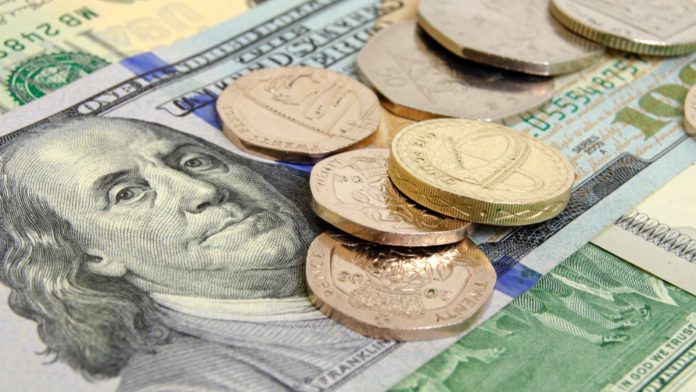The pound dropped to its lowest level of the week versus the dollar. Strong US data and growing concerns over Brexit pushed the pound US dollar exchange rate to a low of US$1.3098.
| What do these figures mean? |
|---|
| When measuring the value of a pair of currencies, one set equals 1 unit and the other shows the current equivalent. As the market moves, the amount will vary from minute to minute.For example, it could be written:1 GBP = 1.28934 USDHere, £1 is equivalent to approximately $1.29. This specifically measures the pound’s worth against the dollar. If the US dollar amount increases in this pairing, it’s positive for the pound. Or, if you were looking at it the other way around:1 USD = 0.77786 GBPIn this example, $1 is equivalent to approximately £0.78. This measures the US dollar’s worth versus the British pound. If the sterling number gets larger, it’s good news for the dollar. |
The pound came under pressure following soft economic and gloomy Brexit news. The UK service sector PMI unexpectedly jumped to 51.3 in February, up from 50.1 the previous month. Whilst this was better than what analysts had been forecasting, drilling down into the numbers and the picture was far from rosy. Activity in the sector slowed as businesses and consumers put off decisions until after Brexit. Additionally, employment in the dominant service sector grew at the slowest past in 7 years as hiring decisions are being postponed until after 29th March. The weakness in the figures sent the pound lower, despite the headline figure beating analyst forecasts.
Also weighing on the pound are headlines that there would be no imminent break through in Brexit talks. Should UK Prime Minister Theresa May return to Parliament without the promised changes to the Irish backstop arrangement, there is a good chance that her Brexit deal will be defeated again. The Chief whip has said that he isn’t confident on numbers to push the vote through the House of Commons, meaning a second defeat is likely. This mean increased uncertainty for Brexit, the UK economy and therefore the pound.
| Why do raised interest rates boost a currency’s value? |
|---|
| Interest rates are key to understanding exchange rate movements. Those who have large sums of money to invest want the highest return on their investments. Higher interest rate environments tend to offer higher yields. So, if the interest rate or at least the interest rate expectation of a country is relatively higher compared to another, then it attracts more foreign capital investment. Large corporations and investors need local currency to invest. More local currency used then boosts the demand of that currency, pushing the value higher. |
Strong Data Lifts The Dollar
The dollar continues to perform well. Data coming from the US on Tuesday pointed to a strong economy. The ISM non-manufacturing data beat analysts’ expectations, at 59.7 in February up from 56.7. New homes sales also beat analyst forecast increasing 3.7%. Analysts had been expecting a decline of -8.7%. The strong data shows that the US economy is still growing despite concerns over global growth.
| Why does strong economic data boost a country’s currency? |
|---|
| Solid economic indicators point to a strong economy. Strong economies have strong currencies because institutions look to invest in countries where growth prospects are high. These institutions require local currency to invest in the country, thus increasing demand and pushing up the money’s worth. So, when a country or region has good economic news, the value of the currency tends to rise. |
Investors will look towards Friday’s US jobs data for confirmation that the US labour market is still strong. Today the ADP report usually gives an indication as to the health of the labour market.
Investors will also keep an eye on developments in North Korea. Kim Jong Un is rebuilding missile test sites after the break down in talks with the US. Whilst this is not currently being viewed as a threat by investors, history has told us that it can escalate quickly. In this scenario the dollar would benefit from its safe haven status.
This publication is provided for general information purposes only and is not intended to cover every aspect of the topics with which it deals. It is not intended to amount to advice on which you should rely. You must obtain professional or specialist advice before taking, or refraining from, any action on the basis of the content in this publication. The information in this publication does not constitute legal, tax or other professional advice from TransferWise Inc., Currency Live or its affiliates. Prior results do not guarantee a similar outcome. We make no representations, warranties or guarantees, whether express or implied, that the content in the publication is accurate, complete or up to date. Consult our risk warning page for more details.
This article was initially published on TransferWise.com from the same author. The content at Currency Live is the sole opinion of the authors and in no way reflects the views of TransferWise Inc.





